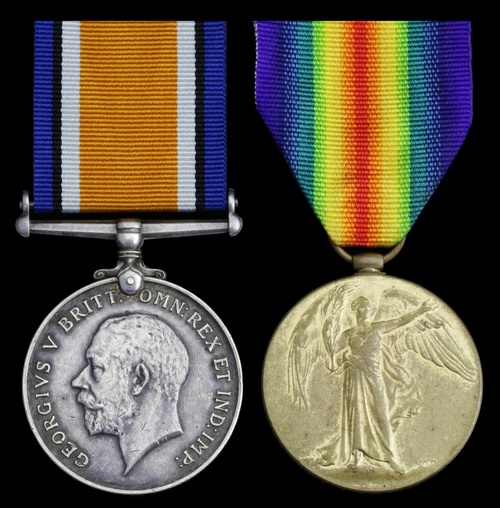
Auction: 18003 - Orders, Decorations and Medals
Lot: 486
Pair: Draughtswoman E. D. Ayling, a founding member of the Women's Royal Air Force, who served in Queen Alexandra's Auxiliary Army Corps at Rouen in 1918 but finding herself placed on clerical duties, rallied her father to successfully argue on her behalf for a more suitable role in the engine repair shops of the Royal Air Force: his strongly worded letter went all the way to General Headquarters, 1st Echelon, and was brought to the attention of the office of Field Marshal Sir Douglas Haig
British War and Victory Medals (39759 Wkr. E. D. Ayling. Q.M.A.A.C.), nearly very fine (2)
Edith Dorothy Ayling was born on 4 March 1897 and lived with her parents at 144 Malmesbury Road, Southampton. She attended the Western District Girls School until the age of 15, before following in the footsteps of her father James who worked as a draughtsman for the Ordnance Survey; her service papers show a 4-year apprenticeship at W. Summers & Payne Ltd., following which she qualified as a naval draughtswoman. She remained with the company a further year on a salary of 25/- a week, before enlisting in the Q.M.A.A.C. on 22 May 1918 as a draughtswoman and tracer, but not before lodging an application with the W.R.A.F. and offering her employer and former headmistress as referees.
Posted a month later to Etaples and thence to Rouen, it seems her professional skills were not required and she was temporarily employed as a clerk in an infantry base depot orderly room; writing on his daughter's behalf to Miss Deane on 1 July 1918, her father was keen to explain her case:
'My daughter (Miss E. D. Ayling, 39759) joined the W.A.A.C. as a qualified ship's draughtsman and is at present in France, where it appears there is no work for her in that capacity, and she has been asked to take up clerical work. As she has had no experience in that class of work, may I ask that she be transferred to some place where draughtsman's work is required, otherwise her four years apprenticeship is thrown away and her future prospects injured.
Had she been told that there was no class of work in France for which she is so highly qualified she would have waited for the vacancy in the R.A.F. at Eastleigh or Swaythling, she having experience of that kind of work.'
The letter had the desired effect and on 25 August 1918 she was seconded to the Royal Air Force in France, but it would be a relatively brief posting. In December she began to suffer from colitis and following a period of leave back to the U.K., Edith was discharged on compassionate grounds shortly thereafter; sold with copied service papers.
Subject to 20% VAT on Buyer’s Premium. For more information please view Terms and Conditions for Buyers.
Sold for
£250




